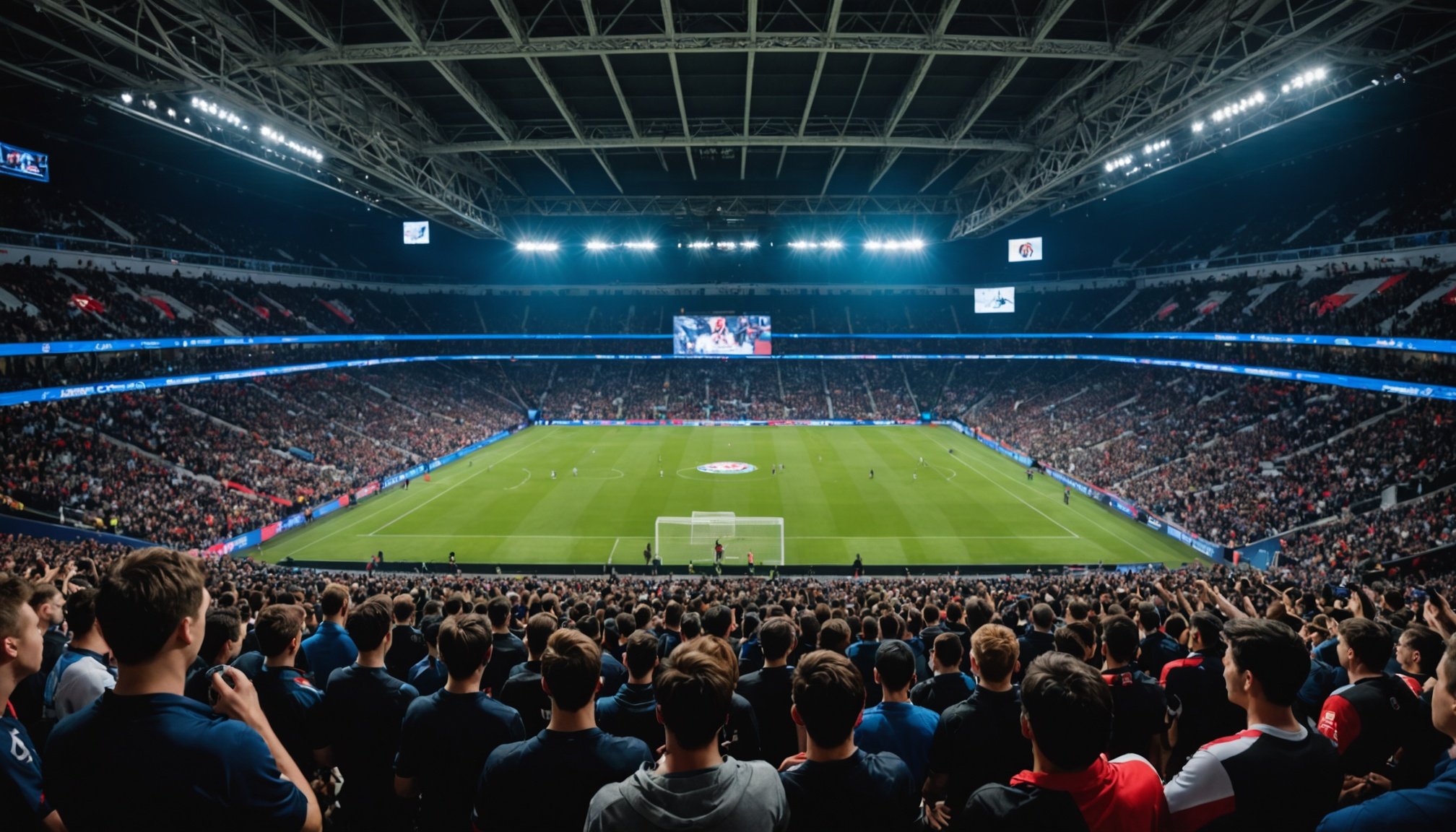Understanding the Intersection of Esports and Football
Esports has experienced a remarkable growth trajectory over recent years, evolving from niche gaming competitions into a global phenomenon that captivates millions. This expansion is largely attributed to the engagement of younger audiences, who are increasingly finding appeal in the competitive and interactive nature of esports. As traditional sports clubs, such as football clubs, navigate this shift, they utilise esports to rejuvenate their brands and connect with these younger demographics.
The perceptions of football clubs among younger fans are evolving, largely influenced by the clubs’ efforts to integrate and promote esports initiatives. This cultural significance stems from the widespread popularity of gaming as a form of entertainment and social interaction among youth. Football clubs, recognising this trend, are leveraging esports as a strategic avenue to foster deeper engagement and sustain fan loyalty.
In parallel : Essential tactics to elevate a football player’s one-on-one defensive mastery
Esports is not just a trend; it represents a dynamic cultural shift where younger audiences seek communities that reflect their interests. For football clubs, delving into esports allows them to remain relevant and expand their influence within this passionate community, ultimately leading to stronger ties and increased brand expansion across varied digital landscapes.
Successful Esports Initiatives by Football Clubs
Exploring how football clubs are engaging with esports unveils innovative strategies that resonate with younger fans. These initiatives cement their status in the evolving digital landscape.
This might interest you : Essential playbook: proven techniques for optimal injury recovery in football players
Club A’s Partnership with Esports Teams
Club A forges strategic partnerships with renowned esports teams, amplifying its digital presence. By collaborating directly with esports professionals, the club benefits from increased visibility and access to established fan bases. These partnerships often result in co-branded content and events, enriching both football and gaming audiences, driving mutual excitement and uniting diverse fan groups.
Club B’s Gaming Tournaments and Fan Engagement
Club B hosts dynamic gaming tournaments, capturing the attention of the gaming community. By focusing on fan engagement, these events foster a sense of community and excitement around the club. Participants often share their experiences across social media platforms, further boosting the club’s appeal to younger audiences. This direct interaction with fans leads to strengthened loyalty and brand expansion.
Club C’s Streaming Strategies on Gaming Platforms
Club C leverages gaming platforms for streaming content, creating an immersive experience for viewers. By utilising platforms like Twitch, they tap into an expansive viewership. This strategy not only showcases the club’s esports prowess but also increases interactions with fans. The seamless integration of streaming content strategically positions the club as a leader in esports engagement within the football community.
Strategies for Implementing Esports Programs
Football clubs venturing into the esports realm can benefit significantly by developing comprehensive esports programs. Establishing a dedicated esports division within the club allows for focused management and strategic alignment with existing football operations. This marketing technique fosters a seamless integration of gaming culture, reflecting the interests of younger fans.
Effective community engagement is crucial. By leveraging social media platforms, clubs can reach broader audiences, particularly those who live and breathe esports. Regular updates, highlights, and interactive content on platforms like Twitch and Instagram keep the fanbase engaged and informed. It also provides clubs with an avenue to showcase their involvement in local gaming events or tournaments.
Engaging with local gaming communities is another essential strategy. By participating or partnering in local esports events, clubs can strengthen their community presence, nurture grassroots interest in both traditional sports, and gaming. This approach builds robust relationships within the esports programs and encourages mutual growth.
By implementing these strategies, football clubs can effectively engage with esports enthusiasts, fostering long-term loyalty and aligning with the digital age’s demands.
Potential Benefits of Embracing Esports
Football clubs that harness the power of esports stand to gain significant benefits, particularly when it comes to enhancing fan loyalty and achieving brand expansion. By integrating esports into their strategies, clubs can effectively tap into the interests of younger audiences, fostering deeper connections and relevance.
One of the most substantial benefits is the opportunities it provides for increased brand visibility. As esports resonates strongly with youth demographics, clubs involved in gaming can capture the attention of this vibrant audience, ensuring their brand remains in the limelight.
Furthermore, by sharing in gaming experiences, clubs can strengthen their ties within communities. These shared experiences foster a sense of belonging, which is essential for sustained fan engagement.
Involvement in esports also opens up diverse revenue streams. From sponsorship deals to hosting tournaments, the esports ecosystem offers varied avenues for financial growth. This adaptability and potential for innovation enable clubs to thrive in an ever-evolving digital landscape, ensuring they remain a pivotal part of sports entertainment across generations.
Challenges and Considerations
Entering the esports arena presents both opportunities and challenges for football clubs. Understanding these can aid in successful integration.
Navigating Market Competition
Football clubs entering the esports market face stiff competition. To succeed, it’s crucial to identify unique differentiators and engage audiences effectively. Establishing a clear brand identity within the gaming community helps in standing out. Clubs can focus on exclusive content and personalised interactions to build a loyal fan base.
Balancing Traditional and Digital Engagement
Striking a balance between traditional sport dynamics and digital engagement is key. Clubs should leverage their existing cultural significance while embracing digital innovation to appeal to younger audiences. This means offering a cohesive experience that resonates across both spheres, ensuring traditional fans feel included in this digital evolution.
Ensuring Authentic Representation in Esports
Authenticity is vital when clubs venture into esports. Fans, particularly younger demographics, value genuine representation. Clubs should stay true to their core values while adapting to esports culture. Incorporating feedback from esports communities fosters trust and enhances reputation. Expert insights suggest aligning esports strategies with the club’s mission to ensure a seamless and authentic integration.
Future Trends and Opportunities in Esports and Football
The intersection of esports and football presents exciting future trends poised to reshape the sports industry. As digital expansion continues, the role of augmented reality (AR) and virtual reality (VR) in fan engagement grows more significant. These technologies offer immersive experiences, allowing fans to interact with content in unprecedented ways.
Predictions suggest that esports integration in sports culture will deepen as clubs harness these advancements. They aim to not only entertain but also engage younger audiences who are increasingly tech-savvy. Such integration caters to fans’ growing desire for interactive experiences, blending gaming with traditional sports.
Looking ahead, we can expect enhanced digital platforms facilitating greater fan participation. Clubs might implement virtual meet-and-greets, gamified match-day experiences, and bespoke VR content to bolster fan loyalty. By effectively leveraging AR and VR technologies, football clubs can pioneer innovative engagement strategies tailored to modern expectations.
These future trends highlight a transformative path for sports clubs, setting the stage for creative opportunities and reinforcing digital presence in the evolving landscape. As football and esports converge, the potential for unique and captivating fan experiences is boundless.











